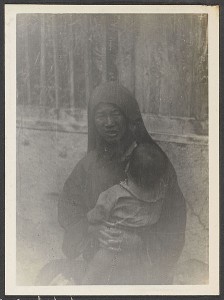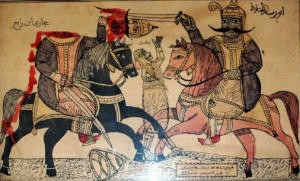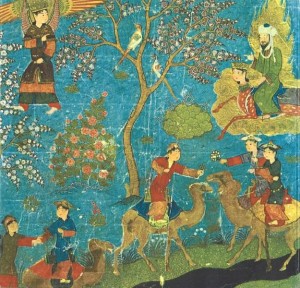Beliefs—Life, Death, Afterlife, Sin, Forgiveness
Created by: Tori Raupp, Mitchell Cunningham and Stephanie Korbas
Life
In life you are either a believer or a non-believer.
“Six Articles of Faith” required by a Muslim believer:
- One God
- The angels of God
- The books of God (i.e. Qur’an)
- The prophets of God (i.e. Muhammad)
- The Day of Judgment (life after death)
- Predestination
Life on earth is directly related to the afterlife. Our actions in this life will determine our placing in the life beyond. To live as a believer and have a shot at paradise, we must accept all articles of faith, especially the belief in an afterlife. To deny afterlife is to deny all other articles. Also, to have a faith in life after death motivates us to live a life free of sin, a life that we will be rewarded for in paradise.
We live as both a body and a spirit. Just as our body is a seed that grows, so is our spirit as we develop our faith.
Sin and Forgiveness
A sin is defined by an act that is forbidden by Allah in the Qur’an.
Committing sins regularly will darken and trouble the heart and make purifying it again a grueling mission.
Allah promises that he will make amends of someone’s minor sins if they avoid the major sins. He also promises admission into Paradise to whoever avoids these major sins.
There is controversy about the amount of major sins. Some say there are only seven owing to the Prophet’s saying and others say there are a total of seventy.
Seven Major Sins
1. Worshiping others with Allah
2. Sorcery
3. Taking a life which Allah has made sacred except in the course of justice
4. Devouring usury
5. Appropriating the property of the orphan
6. Fleeing from the battlefield
7. Charging believing women unmindful through innocent, with adultery
Seventy Major Sins
1. Ascribing associates To Allah
2. Murder
3. Sorcery
4. Not performing the prayer
5. Not paying Zakat
6. Breaking one’s fast during Ramadan without an excuse
7. Not performing the Hajj when able to
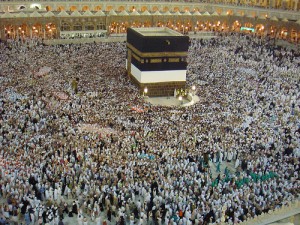
Hajj 2008
by Al Jazeera English, used under 
8. Showing disrespect to one’s parents
9. Severing the ties of one’s relatives
10. Adultery
11. Sodomy
12. Accepting usurious gain
13. Wrong consuming an orphan’s property
14. Lying about the Prophet
15. Fleeing from the battlefield
16. The leader who misleads his followers
17. Arrogance, pride, conceit, vanity and haughtiness
18. Bearing false witness
19. Drinking Alcohol

Beers
by Jeremy Noble, used under 
20. Gambling
21. Accusing a woman of adultery
22. Misappropriating spoils of war, Muslim funds or Zakat
23. Theft
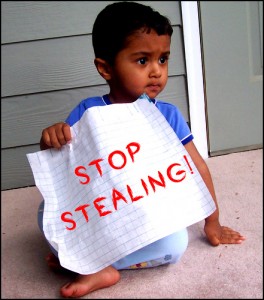
Stop Stealing
by Nisha A., used under 
24. Highwaymen who menace the road
25. The Engulfing Oath
26. Taking people’s property through falsehood
27. Collecting taxes
28. The consumption of Haram
29. Suicide
30. Telling lies
31. The Dishonest Judge
32. Bribery
33. Imitating the opposite sex
34. The one who permits his wife to fornicate
35. Marrying solely to return to the previous husband
36. Not freeing oneself of all traces of urine
37. Showing off in good work
38. Learning sacred knowledge for the sake of this world or concealing It
39. Breach of faith
40. Reminding recipients of one’s charity to them
41. Disbelieving in destiny
42. Listening to the people’s private conversations
43. Stirring up enmity between people
44. Cursing others
45. Breaking one’s promise

Handshake
by Tobias Wolter, used under 
46. Believing fortunetellers and astrologers
47. A wife rebelling against her husband
48. Picture-making
49. Loudly lamenting for the dead
50. Excess against others
51. Overburdening and arrogance against others
52. Hurting one’s neighbor
53. Hurting or reviling Muslims
54. Harming the Servants of Allah
55. Dragging the hem of one’s garment out of conceit
56. Men wearing silk or gold
57. Fleeing of the slave
58. Slaughtering in other than Allah’s name
59. Falsely claiming someone is one’s father
60. Arguing, picking apart another’s words, and quarreling
61. Withholding excess water from others

Water Ball
by @Doug88888, used under 
62. Stinting when weighing or measuring out goods
63. Feeling secure from Allah’s devising
64. Despairing of the Mercy of Allah and losing of hope
65. Forgoing the Congregational Prayer to pray alone without a legal excuse
66. Constantly missing the Friday and Congregational Prayer without a valid excuse
67. Bringing loss to the bequest
68. Deception and evil schemes
69. Spying on the Muslims and revealing their weaknesses
70. Disparaging the Companions of the Prophet
There is no alternative for a sinner except to feel regret for his actions and to ask Allah for forgiveness. This can be done at anytime of the day.
1. Stop whatever the sin is.

Stop Sign
by Steve A. Johnson, used under 
2. Regret deeply and truly for the sin committed.
3. Pray to Allah for forgiveness.
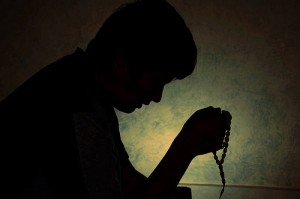
Muslim Prayer Beads
by mrehan, used under 
4. Make a strong, conscious effort never to commit that same sin again.
5. If the sin has an impact anyone else, give back the right that was affected.
Afterlife
Day of Judgment
The Quran says that there will be a day (Last Day) when Allah destroys the world and raises all the dead. Although the deceased are not raised immediately after they die, it is Islamic belief that the souls of the dead will immediately feel what their destiny will become. On this day, Allah will judge the dead based on what they did while they were alive and the balance between the good and evil deeds which they did.

Judgement Day
by Rama, used under 
The judgment takes place on a bridge (sirat) at which people will either be able to cross or fall. With this said, there are two exceptions: warriors who fought for God automatically enter Paradise and enemies of Islam automatically fall to Hell.
Paradise
Paradise is said to be similar to a garden with many different pleasures such as mansions, shade, virgins, and delicious food and drink. The Quran also mentions there are seven different heavens, with one being the greatest and reserved for the most righteous.
Hell
Hell is described to be one of the most torturous places imaginable with eternal pain coming from boiling water, fire, and smoke. Similar to Paradise, Hell also has different levels based on the severity of how evil one’s acts were, with the lowest level containing the tree Zaqqum and a boiling pitch.
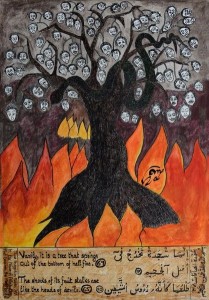
The Tree of Zaqqum
by Shahhh, used under 
Death
When death is close, all the people closest to the individual must be with them. The individual is encouraged to recite the “shahada,” which states that there is only one God, Allah.
Once the individual has passed, all those in attendance must say, “Inna lillahi wa inna ilayhi raji’un” (we belong to Allah, and to Him shall we return”). They must also pray for the sins of the dead individual.
Eyes and jaw of the dead are closed and the body covered in a white sheet.
The body of the deceased is buried shortly after death. Muslims do not believe in cremation for the body must go through a ritual before burial. Autopsies and embalming are also forbidden for they do not follow the ritual and are seen as a violation to the vessel of one’s soul. Islamic funerals include funeral service and burial.

Islamic Child’s Grave
by Samuli Lintula, used under 
Preparing the body for its burial:
Everything is done on an odd number (washing, shrouding etc.). The body is washed three times (Ghusl) and covered (Kafan). Same-sex family members or spouses are usually the ones to do the washing. Washing starts on the upper right to left and continues downward, right to left. If the deceased is a woman, her hair is washed and braided into three braids.
The body is then placed on three white sheets, one on top of the other. The body is positioned as if in prayer. Sheets are folded over the body (Kafan) and ropes are then tied around body, one above the head, two on the torso and one of the ankles. The body is then transported to the mosque for funeral prayer (Salat-al Janazah).
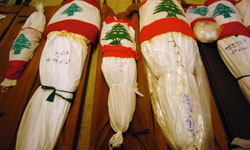
Shrouding the Body
by Scott Peterson, used under 
Funeral service:
There is no viewing of the body. The Salat al-Janazah or funeral prayers are recited by all in attendance in a prayer room or outside (Not in the mosque).
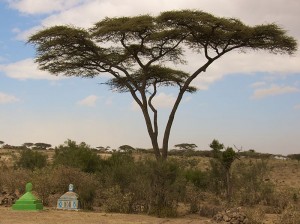
Islamic Grave Markers with Acacia
by A. Davey, used under 
Burial:
After the funeral prayers, the body is transported to burial. By tradition only men are allowed to be in attendance, but sometimes all mourners are allowed. The body is buried on its right side facing the qiblah, the sacred building at Mecca to which Muslims turn at prayer. All in attendance say out loud “Bismilllah wa ala millati rasulilllah” (In the name of Allah and of his Messenger). Wood and stones are then placed on top of the body for protection. Traditionally, it is forbidden to place anything on top of the burial such as grave markers, but overtime this has become accepted.

Lingshan Islamic Cemetary
by Unknown, used under 
Works Cited
“Islamic Beliefs about the Afterlife.” Religion Facts. N.p., 2013. Web. 21 Nov. 2013.
Leatham, Jeremy, et. al. “Islamic Afterlife.” Faithology.com. Faithology, 12 March 2013. Web. 21 November 2013.
MBCOL. “Attending a Muslim Funeral-A Guide For Non-Muslims.” Attending a Muslim Funeral-A Guide For Non-Muslims. N.p., n.d. Web. 02 Dec. 2013.
Sea Services. “The Muslim Faith, Burial at Sea and Cremation.” Muslim Funeral Customs. Sea Services, 2011. Web. 03 Dec. 2013.
Shamsu Ed-Deen Dhahabi, Imam. “Major Sins.” Islam Basics. Ed. Jeewan Chanicka. Trans. Mahmud AI-Qastawi, Wa’il A. Shehab, Abdul-Hamid A. Eliwa, and Ali M. As-Sawi. Http://www.islambasics.com, n.d. Web. 20 Nov. 2013. <http://www.islamguiden.com/arkiv/majorsins.pdf>.
Southernmuslimah. “Very Beautiful Hadith and Forgiveness in Islam.” Web log post. A Glimpse into the Life of Muslimah. Word Press, 06 Oct. 2007. Web. 20 Nov. 2013. <http://southernmuslimah.wordpress.com/2007/10/06/very-beautiful-hadith-and-forgiveness-in-islam/>.
Striepe, Becky. “10 Muslim Funeral Traditions.” HowStuffWorks. HowStuffWorks, n.d. Web. 03 Dec. 2013.
Last Updated: December 3, 2013
